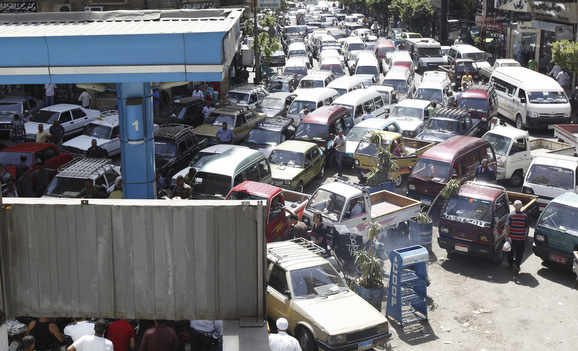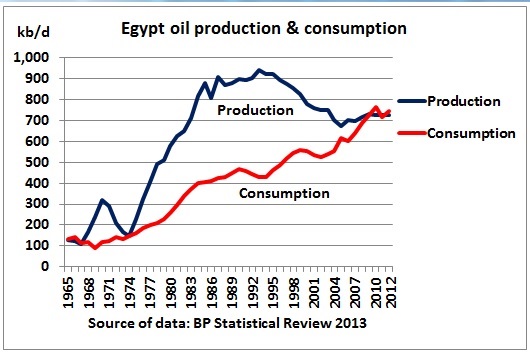Podcast: Play in new window | Download
Subscribe: RSS

A fuel shortage in June clogs the streets of Cairo with gas lines. Egypt’s oil production has peaked, and now so has the patience of its people.
Listen to the prattling of the punditocracy and you would think that millions of people are in the streets of Egypt fighting and dying over how religious their leaders are, or how much democracy they have. (Similarly, you would think that the most vital problem in America today is abortion, with lack of homosexual privileges a close second.) In the real world, where actions have consequences, people do not risk their lives unless their lives are already at risk. People who have bread do not riot. The longer we go without understanding why countries come apart, the closer comes the day when our country falls apart. And we will be so surprised!

This is a chart that should strike mortal fear into the heart of every resident of an industrialized country. It represents Egypt in particular, but every oil well, and all oil wells together, and shows clearly where things fall apart: when supply no longer meets demand.
In Egypt, as in every other industrialized nation, it is all about oil. Oil enriched the country for 25 years until 1992, when production peaked and began its inevitable decline. Now that consumption exceeds production (see chart) peak oil is impoverishing the country that oil built. Uncertain supplies are interfering with personal transportation (see picture above), electric generation and agriculture.
While the good times rolled, Egypt cheerfully subsidized the cost to its people of gasoline and diesel fuel and natural gas. The people cheerfully arranged their lives so that they were utterly dependent on cheap diesel fuel to grow and transport their crops, cheap gasoline to transport themselves and to do business.
Today, energy subsidies eat 30 per cent of the country’s entire budget. Instead of being able to pay the subsidies with the abundant proceeds of oil sales, Egypt now has to import the oil, thus paying both for the oil and the subsidy. To say that this is not a sustainable business model is to show a fine grasp of the obvious: the Egyptian government owed more than $6 billion (as of last October) for oil and natural gas. Supplies of gasoline, diesel fuel and natural gas (and hence electricity) to the Egyptian people are being interrupted with increasing frequency.
By the way, Egypt, too, has a fracking revolution going on. It accounts for the hiccup in the chart’s falling production line that starts in 2004, and fended off for a year or two the fateful day when demand exceeded production.
As with oil, so with bread. Egypt, once able to grow all the food it needed, now must import 75 per cent of its wheat, the staple grain. Climate-change-driven droughts and crop failures in the world’s wheat-growing regions have doubled the cost of wheat in the past year. Egypt’s impoverishment (see peak oil, above) means that it can no longer afford to buy the wheat it needs, or continue to maintain subsidies on the price of bread.
For two years, Egypt has been trying to swing a loan from the International Monetary Fund of $4.8 billion — not enough to pay uts gas bill of last October. During that time, the country’s currency reserves have bled out from $36 billion two years ago to $13 billion in March. Before approving the loan, the IMF requires that taxes be raised and subsidies cut, moves that would guarantee revolution no matter who is in charge. Desperate nbot to remove subsidies, the government hopes to roll out a national rationing plan for fuel and bread this fall.
After the Titanic has hit the iceberg, you can change captains as often as you want, and it will not change the fate of the boat. So carry on, Egypt, find yourself a secular president, a Sufi, a Salafi, A Coptic Christian or a Baptist, but until you find a way your people can provide themselves with food and fuel, you will not rest from chaos.
The Arab Winter — creating failed states with collapsed economies and starving people — is spreading. Make no mistake: it is coming here, to America, to every industrialized country.
Because the terrifying chart of Egypt’s oil production and demand, which has reached the self-destruct point, is the chart of every oil-addled nation, and of all of them together. Change the years a decade or two one way or the other, change the amounts of oil a few million barrels a day one way or the other, and presto! you’re looking in a mirror. And that self-destruct point, where the lines cross? It’s almost here.
-0-
Excellent. Thank you for putting this into perspective and cutting through the miasma of mainstream reporting.
Taking this opportunity to thank you, Gail, for posting the link to Maher’s “New Rules” atheism clip on NBL recently. Somehow I missed that one as his show is one of very, very few I regard as “must see,” using that term loosely. He was at his best in that one! :) Moreover, while your “take-downs” of the “believers” on NBL have been “pleasant” reading (though I’m finding the threads there more than a little tedious), I hope you realize that such refutations are an exercise in futility. “Believers” are, one and all, regardless of “faith” or doctrine, hopelessly assimilated into their “congregation” and absolutely will not be swayed by any measure of fact or reason. I say that from my experiences of tilting at those windmills for more than 40 yrs. As J. Krishnamurti has said, “It is no measure of health to be well-adjusted to a profoundly sick society.” That holds for any size “society” regardless of granularity.
Actually, what we’re looking for here, colinc, is a discussion of the stuff on this website. Gail can be reached on hers, Bill Maher on his. Not that I don’t appreciate your input, I do.
Thank you, Mr. Lewis, I do apologize to you and other readers for branching off topic. Please feel free to remove my comment above, no offense will be inferred.
I completely concur with Gail. However, while the “mainstream media” misrepresents the situation in Egypt, among myriad others, I think both of you must be aware that this information has been presented elsewhere, and often, in the blog-o-sphere. Regardless, spreading the real causes for the turmoil there and elsewhere can not, should not, be trivialized. Nonetheless, when Mr. Lewis writes “And that self-destruct point, where the lines cross? It’s almost here.” I have to “disagree,” but perhaps I am just mincing words/meaning. To be clear, my assessment is that that particular “self-destruct point” is already here and in other “developed” countries and is gathering momentum. In other words, the drought plaguing the U.S. grain-belt and west (and elsewhere) is not the 2011 drought, or the 2012 drought… if one “pages through” the entirety of the US/Global Drought Monitors it should become apparent that the droughts have been afflicting all the major crop producing regions for a decade or more, with only a “few” interspersed years of “average” or [slightly] “above average” precipitation which by no measure ameliorates even the prior years’ aridity.
Moreover, while food production and delivery will be a very grave concern, I can’t help wondering what will happen when all (or just many) of the coal-fired electric-generation facilities in those regions no longer have water to produce electricity. The EIA recently “upgraded” the U.S. energy-infrastructure to a “D+” based, primarily, on the construction of a couple of solar plants in the northwest and northeast. Those will be of little consequence to the people of AZ, NV, UT, CO, KS, OK, NM, etc. Furthermore, I can readily imagine that the failure of even just a [few] dozen of such coal-fired facilities may, in fact, bring down the entire continental grid, at least for a “short” time. However, even after power is(?) restored to the west coast and east of Ol’ Miss’, it is unlikely that those drying states will be so fortunate. What then?